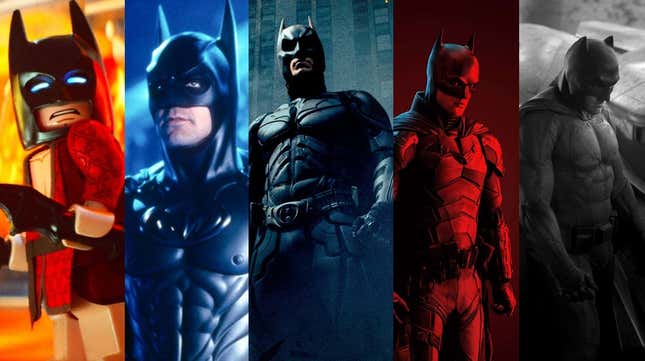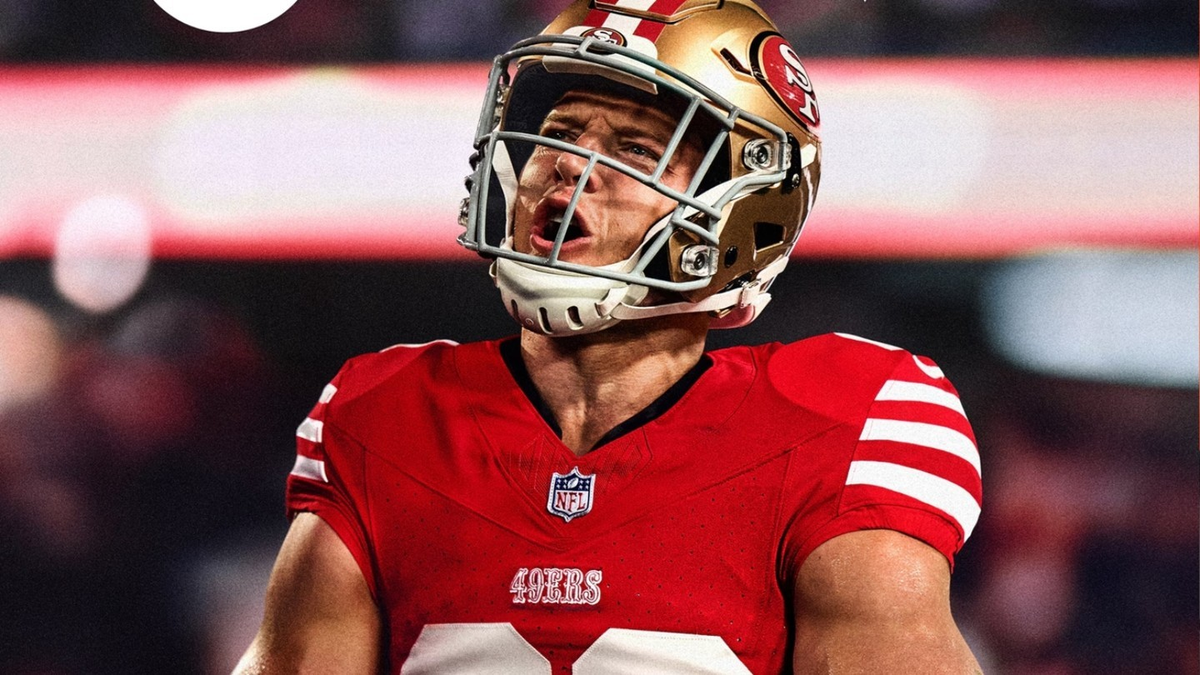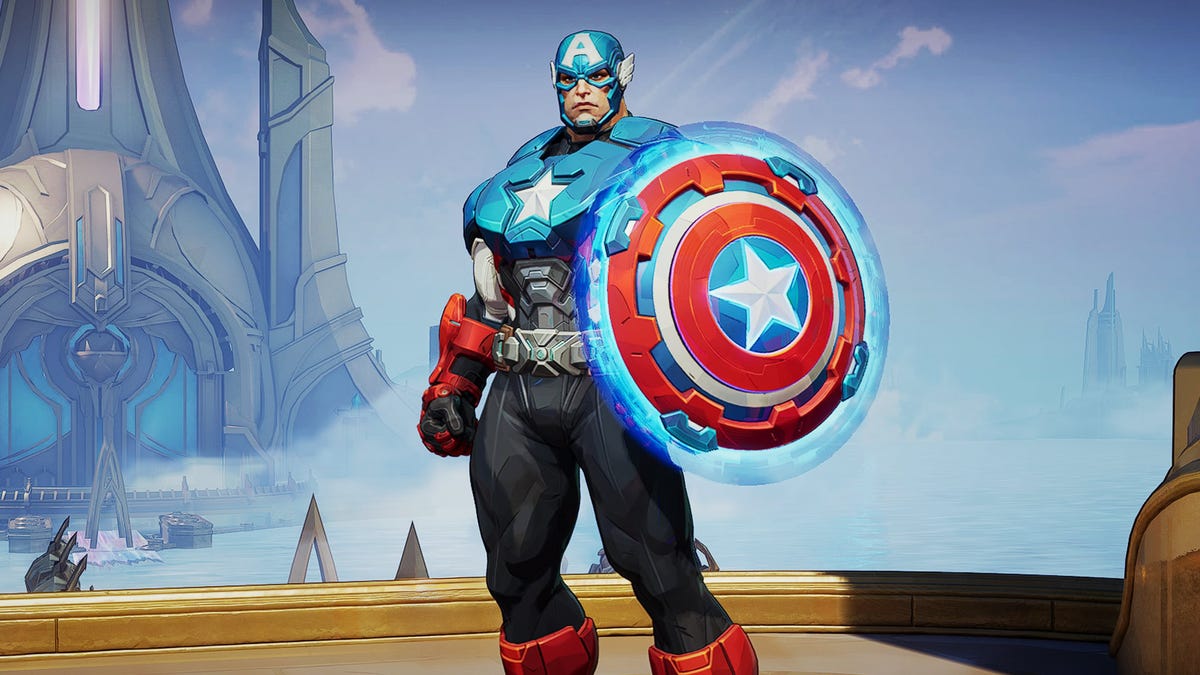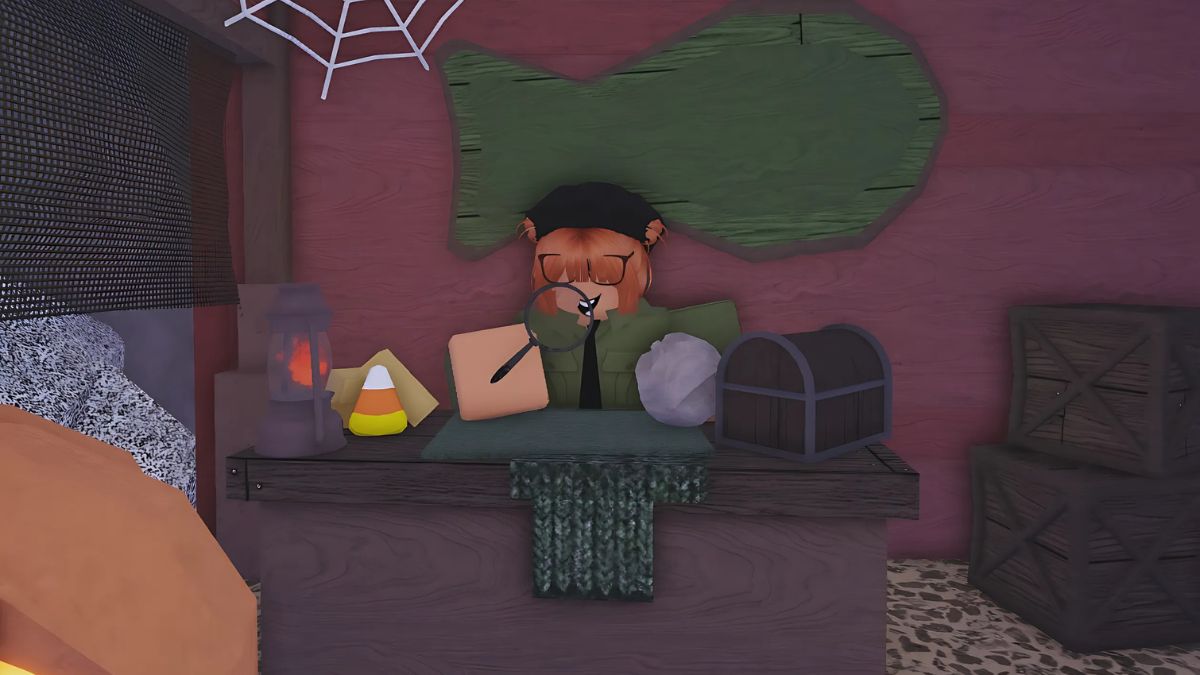
Illustration: DC / Warner Bros. / Kotaku
Some call Batman the “Caped Crusader,” while others call him Christian Bale, Kevin Conroy, Michael Keaton…In his 85-year-long tenure as a sulky billionaire with wings, Batman has found the time to be a generous movie star, so today we honor him by ranking notable movies set in the Batman universe. (Apologies, Adam West fans, but 1966's Batman: The Movie isn’t here. We won’t complain if it remains #1 in your own personal ranking, though.) As you read through this list, you’ll notice that some Batman movies have a huge quality gap. For example, it’s tough to pit the controversial 2017 Justice League—which was ultimately outshone by Zack Snyder’s four-hour director’s cut—against Christopher Nolan’s highly regarded The Dark Knight Trilogy. In other cases, Batman has nipples on his suit, but I tried not to let that influence my rankings.
I told you Batman’s nipple suit wouldn’t sway me! Though, I have to recognize that George Clooney wears it with considerable poise in this 1997 film, which otherwise suffers from a serious lack of substance. In his ultimately futile effort to find a cure for his cryogenically frozen wife’s incurable illness, Mr. Freeze (Arnold Schwarzenegger) plans to freeze all of Gotham (“and then…the world!”). But Mr. Freeze quickly learns that you can’t fight ice with ice — Poison Ivy (Uma Thurman) has her own agenda, and she defrosts Freeze’s wife and leaves her to die.
One-liners and one-dimensional character building ensue as Batman, Robin (Christopher O’Donnell) and Alicia Silverstone as Batgirl try to save the world with their latex out. But, though Batman & Robin is widely thought of as the worst Batman movie in existence, it’s not completely without merit. It offers a very ‘90s take on the ‘60s Batman TV show’s holy, campy excess. For example: when I first watched Batman & Robin as a middle schooler, I kept replaying the scene where Uma Thurman performs a sultry striptease out of a gorilla costume, and I wondered if I was bisexual or if I just liked the part where she’s a gorilla.
Oh, Ben Affleck Batman, if only you spoke in a normal vocal register for 2016's Batman v. Superman, maybe then J. Lo wouldn’t have divorced you. Or maybe not—Batman’s lawnmower voice isn’t the only issue with this Zack Snyder movie, which struggles for air under the constraints of its convoluted plot.
At first you’d think that Batman v. Superman would be a movie that explores the complexities of justice; Batman doesn’t like how Superman does things, and vice versa. That’s a natural assumption for a movie called Batman v. Superman, but then you realize that no one in it knows why they want what they do—and Batman would like to build a kryptonite grenade launcher. The movie’s showstopper fight is with the colossal Gila monster Doomsday and, though he is fearsome, Gal Gadot as Wonder Woman looks like she’s sleeping with her eyes open when she helps Batman and Superman take him on. It’s all over-the-top, and overly complicated. In all the excess, Batman v. Superman forgets to build out its characters, or pay accurate tribute to the grim Frank Miller comics it’s inspired by.
The Flash was doomed from the start. Ezra Miller was first announced to star in the movie — which was ultimately released in 2023—back in 2014. From there, The Flash got passed around by writers and directors for nearly a decade before being delayed again by the covid pandemic. Then, beginning in 2020, Miller became embroiled in a series of grave controversies, eventually leading them to release a statement in 2022, which cites “complex mental health issues.” For all the pain and confusion it’s associated with, The Flash is regrettably mediocre. Bad acting and special effects abound in what might have never been meant to exist in the first place.
The biggest problem with Batman: The Killing Joke is that it’s unmemorable. The same cannot be said about Alan Moore’s 1988 graphic novel of the same name, which chilled me so viciously as a teen, I started reading Nietzsche.
Its plot, which is recreated in the second half of the 2016 animated movie, provides a popular origin story for the Joker: a failed comedian falls into an acid pit, which burns him into the white-faced Joker. In the present, Joker paralyzes Barbara Gordon by shooting her through the stomach, then he kidnaps her father, Commissioner Gordon, torturing and goading him into going insane.
But the first half of the 2016 movie is dedicated to what ultimately feels like an auxiliary story about Barbara, as Batgirl, being horny and violent, subject to her overwhelming emotions as a woman. Then, even with Mark Hamill’s legendary voice acting, the more faithful second half of the movie can’t capture the insidiousness that artist Brian Bolland manages to transmit with the stationary comic book page.
I know that Zack Snyder’s self-congratulatory, four-hour director’s cut of his 2017 Justice League has become a fan-favorite, but let’s acknowledge the tragedy of the original theatrical cut. Ben Affleck’s lawnmower Batman voice is back, as is Gal Gadot’s medicine acting, and Ezra Miller’s agitated Barry Allen. After raising Superman (Henry Cavill) from the dead by dousing him in amniotic fluid, the heroes try to take on the alien military general Steppenwolf with special effects excess. Its stakes feel low, and its premise unexciting.
Not only did 2004's Catwoman earn Oscar-winner Halle Berry a Razzie for Worst Actress, it also was named Worst Picture, Worst Director, and Worst Screenplay. All they forgot was Worst Game of Pickup Basketball. But, there are plenty of diamonds to find if you sift through Catwoman’s stiff dialogue, gloopy CGI, and contrived story (Catwoman works to uncover a murder plot at a cosmetics company—you know, woman stuff). In recent years especially, Catwoman has been reclaimed as a slutty cult classic. When you watch it through this lens, you’ll see that it’s full of perfect outfits and throwaway lines, like when, amid the thrum of Catwoman’s near-constant, flirty R&B, Catwoman orders “a White Russian, no ice. Hold the vodka, hold the Kahlúa.”
The bartender slides it over: “Cream, straight up,”
Joker is complicated. Joaquin Phoenix (who famously lost 52 pounds to play the sallow, unsuccessful comedian Arthur Fleck) is convincing in Todd Phillips’ 2019 movie; as he’s constantly beaten and ridiculed throughout Joker, Phoenix takes on the ineffable fragility of a picked flower. Though the movie operates in exhausting black-and-white thinking, you still wish for Arthur’s preservation…until he starts killing everyone. Then, Joker becomes an acrid power fantasy, eliminating all of Arthur’s softness with a flamethrower. It does, at least, make an interesting argument for nihilism, and its impact on culture has been significant, but it’s not as clever as it presents.
2020's Birds of Prey is everything Joker is not: tender, approachable, and cute—cloyingly so, at times. An affable Margot Robbie reprises her role as Harley Quinn, who just got dumped. She goes through stages of grief, chopping off her pigtails and adopting a hyena, until the whole world starts wanting her dead. With help from characters like Black Canary (Jurnee Smollet) and The Huntress (Mary Elizabeth Winstead), Harley Quinn takes on some bad boys and protects young Cassandra Cain (an effervescent Ella Jay Basco) from harm after she steals a precious diamond. In the process, she rediscovers who she is without a green-haired madman holding her hand. Like its antihero protagonist, Birds of Prey won’t save the world, but it is a lot of bubbly fun.
Joel Schumacher’s 1995 Batman Forever might be unpopular, but hear me out. Does the movie’s cheesy theatricality often get it criticized for being a giant Batman Forever toy ad? Yes, but it’s a very good ad.
Two-Face (Tommy Lee Jones doing his best ham imitation) and the Riddler (an electric Jim Carrey) team up to torture Batman, taking his love interest (Nicole Kidman) and partner Robin (Chris O’Donnell) hostage. Batman triumphs, in the end, by combatting the Riddler with a bad riddle of his own—”I see without seeing…to me, darkness is as clear as daylight,” Val Kilmer says with gravel in his mouth.
Then, there are many impressive sounds of agony, and the Riddler’s brain gets sucked dry by ‘90s CGI. None of it is innovative or smart, but it is pleasant to watch with your mind powered off. And Batman Forever has one of the series’ most exciting romances, too. I’ve always wanted to see Nicole Kidman make kissing a guy in a polyurethane rubber mask look glamorous.
In its strong cast and (mostly) focused plot, The Dark Knight Rises shares merits with the rest of Christopher Nolan’s revered Dark Knight trilogy. Christian Bale is as tortured as ever, and Tom Hardy, hissing through the claws of his facemask, continues to be an imposing and calculated villain. The 2012 movie is a solid end to Nolan’s series, and it excels in its anxiety-inducing scenes of Bane and other villains forcing their way into political power. But it fumbles near the finish line, where it tries to introduce an underwhelming plot twist. It doesn’t feel necessary — The Dark Knight Rises is at its best when it’s being intuitive.
The best part of Tim Burton’s 1989 Batman is what it did for the franchise. In 1989, audiences were accustomed to the spiky POW! graphics and tiny underwear associated with the 1960s Batman TV series. It had (and still has) merit as an accurate representation of Batman’s Silver Age comics, and as proof that billionaire orphandom doesn’t need to make a guy any less charming.
But Tim Burton’s 1989 Batman destroys that feel-good image in compelling ways. What it lacks in fascinating plot (the lovely journalist Vicki Vale (Kim Basinger) is kidnapped by Jack Nicholson’s frighteningly lucid Joker, and smitten Michael Keaton has to save her), it makes up for in psychology. It creeps into you. Everything is gray, bleak, foggy—except for the Joker’s catlike smile, which stretches into a red wound.
“Have you ever danced with the devil by the pale moonlight?” Joker asks a young Bruce Wayne after killing his parents.
That single line alone has attracted decades of fan analysis and discussion. And, single-handedly, Batman has made it captivatingly impossible for its hero to ever recover his Adam West sparkle.
In 2005, Nolan started his Batman trilogy with Batman Begins, delivering Bruce Wayne deeper into the dark Tim Burton conjured in the ‘90s. In Nolan’s hands, Batman is an even more serious creature, unlikely to ever tolerate the fact that the 1989 Joker wears a purple hat. Instead, he trains from childhood to become a weapon, though he ultimately rejects a recruitment opportunity from the League of Shadows when joining would require him to kill.
So Batman Begins is as much about Batman’s creation as it is about his conflicted morality, heightening encounters with Scarecrow (a genuinely frightening Cillian Murphy) and Ra’s al Ghul (Liam Neeson), who come with their own visions of paradise. Moral gray is the bulk of what makes Batman Begins interesting, though, for all its characters’ frowning, it does have some classic superhero fun—Liam Neeson, for example, plans to microwave Gotham’s water supply.
I don’t know if any crystal ball could have predicted that The Lego Batman Movie would become one of the most beloved Batman movies in history, but here we are.
The 2017 cartoon is a loving ode to Batman lore that’s all-ages funny, with charismatic voice acting and vibrant animation. Its screwball plot starts with Batman offending the Joker—who wants to be a meaningful part of Batman’s life—and ends with Batman acknowledging his intimacy issues. So, while it provides plenty of sloshing buckets of fun, The Lego Batman Movie is also full of warm and fuzzy tenderness. You’ll want to return to it with butter popcorn and a comfortable blanket in hand.
OK, let’s shift gears significantly from The Lego Batman Movie and talk about 2022's The Batman.
At its core, The Batman is a detective movie. That’s good news, considering Batman is meant to be the “World’s Greatest Detective.” After the Riddler (an insidious Paul Dano) murders the mayor on Halloween, Batman (moody Robert Pattinson) investigates the crime with police Lieutenant James Gordon (Jeffrey Wright). In downcast glances and trails of blood, Batman handles bombs and the mounting air of desolation that falls on Gotham. But, even in the pall, he finds hope.
Batman’s emotional journey here is captivating, and the villainy he’s up against is remarkably believable for a superhero caper. It’s easy to feel The Batman’s tension floating into your body. And The Batman is original. There are hardly any other Batman movies as devoted to noir as this one.
The 1993 animated film Mask of the Phantasm communicates what made Batman: The Animated Series so iconic. Like the TV series that spawned it, whose reruns defined my teenage years, Mask of the Phantasm treats animation like a serious medium for serious material—it doesn’t hesitate to show you Batman as both a romantic and broken man.
The movie, which features Kevin Conroy and Mark Hamill’s perfect voice acting for Batman and the Joker, also loosely references Frank Miller’s Batman: Year One and Mike W. Barr’s Year Two comics. In it, Batman faces murder accusations and the reality that his ex-fiancée is a lying Grim Reaper, who might still love him. It’s all as emotionally complex and volatile as you’d think, making endless rewatches a necessity.
It’s hard to imagine another Batman movie dethroning The Dark Knight’s influence on culture. Nolan’s 2008 movie is thrilling and painful; the Joker (Heath Ledger) terrorizes Batman’s love interest Rachel (Maggie Gyllenhaal) and her love interest, the district attorney Harvey Dent (Aaron Eckhart), and then anyone else he can set on fire. As Alfred (Michael Caine) famously says in one scene, “some men just want to watch the world burn.”
And that’s what makes The Dark Knight incredible, how much Heath Ledger sells that idea. We’re almost two decades removed from his performance, and still no other Joker has been able to replicate the effortless depravity Ledger found in caked face paint and nervous energy.
I think I’ve seen Tim Burton’s 1992 Batman Returns more than the palm of my hand. It’s my favorite Christmas movie.
The Penguin (Danny DeVito, being perfectly strange) and Catwoman (an irresistible Michelle Pfeiffer, being perfectly strange) frame Batman for murder while the rest of Gotham tries to enjoy their festive Christmas tree lighting. But the Penguin—Oswald Cobblepot, abandoned as a deformed child and now rejected by society for his violence—still has further to fall. Catwoman, too, digs into vengefulness with her long razor nails.
Both characters serve as an interesting argument that humanity is a choice; both ultimately push down forgiveness and empathy in order to sink into their animal personas. Michael Keaton’s Batman isn’t immune to the dark call of the beady bat, either—he eventually uses a swarm of them to completely incapacitate the Penguin. So Batman Returns doesn’t bother with the tunnel vision morality of some lesser superhero movies. It exhumes the beast inside all these self-aggrandizing people in their disguises, and it does it with stunning clarity and magnetism.

 4 months ago
92
4 months ago
92







![Anime Reborn Units Tier List [RELEASE] (November 2024)](https://www.destructoid.com/wp-content/uploads/2024/11/anime-reborn-units-tier-list.jpg)
